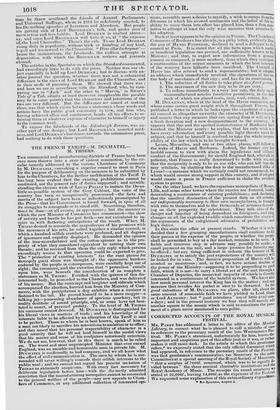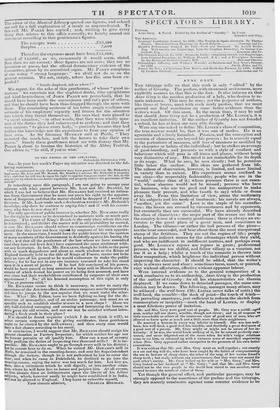CORRECTED ACCOUNTS OF THE ROYAL MUSICAL FESTIVAL.
MR. PARRY has addressed a letter to the editor of the Musical .Library, to correct what he is pleased to call a mistake of ours in reference to the pecuniary result of the late Westminster Fes- tival. Mr. PARRY'S statement, unfortunately for him, leaves the important and suspicious part of this affair just as it was, or rather makes it still more dark. In the article to which this gentleman refers,* we expressly stated that the only official document which had appeared, in reference to the pecuniary result of the Festival, was that gentleman's communication (as Secretary to
the noble
Committee) at a special meeting of' the Royal Society of Musicians, " that a surplus of 76001. remained, which was to be equally di- vided
ed between" the three musical charitable institutions and the Royal Academy of Music. The receipts (in round numbers) we stated at 22,000/., leaving 14,0001.as the expenses of the Festival. We requested some explanation of this extraordinary expendltare•
• $x Spectator, August 2.
The editor of the Musical Library quoted our figures, and echoed our call for a full explanation of a result so unprecedented. To this call Mr. PARRY has replied ; and, wishing to give every thing that relates to this affair correctly, we hereby amend our statement according to that gentlemans figures.
The receipts were £23,500 Surplus 7,600 Therefore the expenses must have heen.£15,900;
instead of 14,6001., as we, erroneously it would seem, stated. Now then we are correct : these figures are not ours ; they are no invention or guess, but the official documentary evidence of the Committee, given by its accredited organ. Mr. PARRY complains of our using " strong language : " we shall not do so on the present occasion. We ask, simply, where has this sum been ex- pended? " Gentle shepherd, tell us where?"
We regret, for the sake of this gentleman, of whose "good in- tentions " we entertain not the slightest doubt, (the uprightness and kind-heartedness of JOHN PARRY are proverbial), that he should have been made the convenience and cat's paw of others, and that he should have been thus dragged through the mire with them. The concluding sentence of his letter amply confirms our estimate of his employers' capacity and fitness fur the situation into which they thrust themselves. He says they were placed in "a novel situation,"—in other words, that they were wholly igno- rant of the duties they had volunteered to perform ; and that they were anxious "to please every body,"—precisely because they had neither the knowledge nor the experience to firm any opinion of their own. As Sir GEORGE MURRAY said at Perth, " They mounted the coach-box, and left the horses to take their own course." Surely these gentlemen must see with dismay that Mr. PARRY is about to become the historian of the Abbey Festival. Our advice is, " lie still, if you're wise."



















 Previous page
Previous page